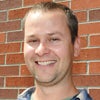 |
Student researcher:
Amanda Johnston Student funding sources: Student Opportunities for Academic Research (SOAR), Summer Undergraduate Research Fund (SURF), Rose Hills Foundation and Provost’s Undergraduate Research Fellowship |
 |
Adviser:
Matthew Dean |
Amanda Johnston’s to-dos once she earns her bachelor’s degree this May are pretty weighty. At the top of the list: a) train to become an emergency medical technician and b) attend medical school. She’s interested in studying infectious diseases and possibly joining Doctors Without Borders or the Navy National Guard, where she would be responding to crisis situations.
As an undergraduate, she’s been gearing up for a career in medicine, most recently in Matthew Dean’s genetics lab as a research assistant on a study of reproductive proteins.
Dean, assistant professor of biological sciences, studies how genetic variation affects the fitness of organisms. In his lab, Johnston performs polymerase chain reactions to analyze rodent DNA to study their genotypes. She’s helping to determine if they possess certain alleles that would cause males to produce the protein transglutaminase 4, which leads to the formation of a structure in a female rodent’s reproductive tract during copulation that helps her to conceive.
The data that Amanda are collecting could potentially help provide a larger framework of understanding for infertility issues in humans as they relate to seminal proteins, which are often overlooked in overcoming the challenges of infertility.
When Johnston applied for her current position, Dean could immediately see that she was a great fit for his lab. He asked her about her previous research experiences — including a study on retinal degeneration — and she launched into a detailed explanation of her work and her goals. Her enthusiasm and scientific understanding shone through.
“I said, ‘This meeting’s over. You can work in the lab,’” Dean recalled. “I thought, wow, she really gets it.” Her work has proven him right, he said. “She’s very independent and thinks carefully about how to solve the problems she’s faced with in our research.”
While patient care will be a priority in her chosen profession, it’s important to see other aspects of science, Johnston said. “I’ve definitely learned a lot about molecular biology and laboratory techniques, which are important for clinical research in the medical field.”
Return to Scholarly Symbiosis >
Read more articles from the Spring/Summer 2012 issue of USC Dornsife Magazine